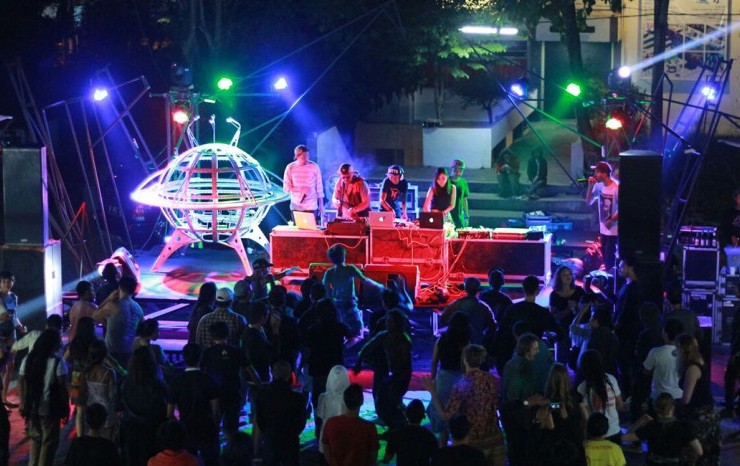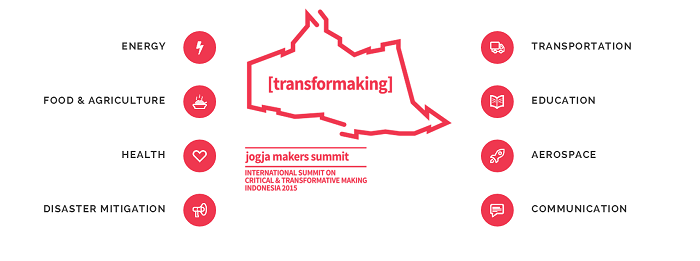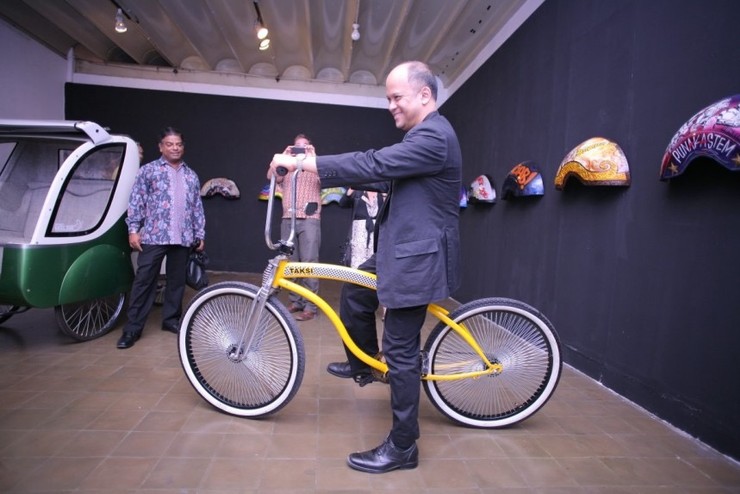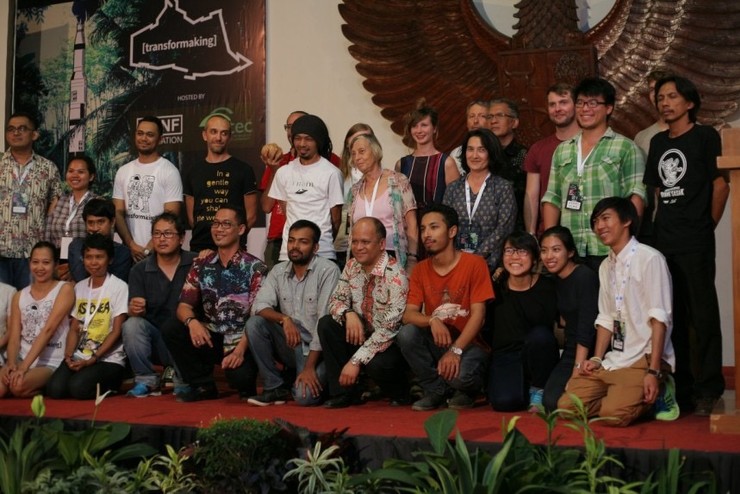
The summit's performance space
In September 2015, Jogjakarta National Museum opened its doors for Indonesia’s second Transformaking summit, featuring an intensive five week programme of creative residencies, a maker’s exhibition, and independent market, culminating in a hotly anticipated symposium. With support from the British Council, I had extended a working trip to Singapore to contribute to Transformaking in Indonesia. We’ve been working extensively in South East Asia this year, so the opportunity to contribute to a grassroots led event like Transformaking came as a contrast and perfect balancing act to the smart cities focus of our festival in Singapore.
Earlier in the year, we had worked with the British Council to bring Venzha Christ, from the HONF Foundation, to the Global Futr Lab at our 2015 Manchester festival (2016 has just gone on sale - you won't be disappointed). Having heard much from Venzha about the thriving creative scene in Jogja, soon after my arrival at the National Museum, I was pleased to see the self-declared International Summit of Critical and Transformative Making effortlessly fulfill its title; Transformaking was a veritable feast of community activism, critical theory, and staunchly independent maker culture. A far cry from the tech startup evangelism now prevalent in the West, Venzha and the HONF Foundation have set out to unleash the transformative potential of art and design on society.

Batik, Rockabilly, and Flying Saucers
Arriving at the venue, the first thing that struck me was the steel frame of some kind of extraterrestrial space vessel, imposing over the stage and audience. I was soon informed by Steven Kovats - from r0g_agency for open culture and critical transformation, and previously Transmediale - that this UFO was Venzha’s calling card; for me it was a vital provocation and sign of things to come.
Whilst getting acquainted with fellow speakers and exploring the exhibition, I was greeted by a rich array of design work from across the region. The exhibition was an incisive critique of global tensions between production, cultural heritage and contemporary consumerism.
The first gallery had been filled with with vintage style hot-rod mudguards, by Aan Fikriyan of KustomFest, a custom modernist style Becak (Bicycle taxi), and a cruiser bicycle, the latter being trialled by Jakarta entrepreneur and event partner Ilham Habibie.

Jakarta entrepreneur and event partner Ilham Habibie on the cruiser
Transformaking’s artistic director, Venzha Christ, had curated a beautiful array of handicraft, critical design artifacts and technical prototypes; many pieces were upcycled and adhered to strict sustainable design principles. My personal favorite artifact was the output of university research converting fruit stones, such as durian, into biodiesel; this work perfectly illustrated the relevance of transformative making to art-science.
Java has a long tradition in Batik design, fabric manufacture and a distinct architectural style. Given recent challenges with deforestation, and economic development across the archipelago, Jogjakarta seemed to be the perfect home to explore the tension between development and sustainability; innovation and tradition. Through this exhibition, the ornate sensibilities of Jogja’s architecture and millennia old design traditions, Transformaking evolved a new breed of DIY subculture, with rockabilly aesthetics.
Alongside such energy and a strong sense of camaraderie, it was the sheer calibre of work on display at the museum had made my 30 hour journey from the UK worthwhile. Transformaking had rapidly introduced me to a thriving community, carving a new niche for world leading artists, hackers and makers. Venzha’s exhibition had transformed an otherwise austere public building into a vibrant hub of creativity and critical thought. I left the building convinced that we need to up our game at home!
Symposium
Having been asked to discuss the role of grassroots innovation in the digital creative economy, I had prepared a relatively broad presentation exhibiting some bottom-up and open source initiatives, for instance Usman Haque’s ‘Thingful’, as an illustration of the impact of open culture. However, having spent only a few hours at an eye-opening exhibition the night before, I did start to worry that I could be preaching to the converted.
Diversity and freedom of expression are raw materials in a creative economy. By inviting the full spectrum of creative researchers, artists and technologists in an open forum, Transformaking succeeded in setting a high bar for critical discourse in Asia and beyond. The quality of programming in the symposium only went on to further secure this position on the global circuit, with speakers travelling from locations as far apart as Toronto and Kathmandu. Panel discussions engaged speakers from across Indonesia with one researcher presenting a fascinating PhD thesis on bootleg cassette culture in 1970’s Indonesia. It was through these unique and insightful talks that I felt the digital focus of my own presentation could complement the narrative on ground-up technology initiatives and digital innovation, after all it is this variety that really drives social innovation.
The speaker programme traversed critical theory, French sociology, open citizen radio networks, and ground-up initiatives from across Indonesia; of particular note to the grassroots in the most literal sense, Professor Susilawati of Kupang University, presented her work on new methods of monsoon water capture and management in rural villages.
A previous FutureEverything collaborator, Gustaff Harriman Iskandar, discussed his work with rural tribal communities, how he is using community art methods and technology to help document and sustain traditions historically passed between generations through oral tradition. This process had been disrupted heavily through the colonial era, so his intention has been to help restore this, using methods now common in digital and creative practice. To illustrate the socially transformative potential of technology, Iskandar recounted a recent excursion to rural Java, in which a tribal chief was using drones to report illegal logging and forest fires.
Presenting bilingually in Bahasa and English, Margot Lederer, Senior Economic Development Specialist at City of Oakland, shared learnings from the making community in California. Her passion for local production, inclusion and community engagement was evident throughout her talk, and questions from the audience suggest that such insights from urban making communities in the US, were just as relevant to Indonesia.

The Transformaking team
As a recovering childhood electronics hobbyist, the work of Sharath Chandra, from the Centre For Internet and Society in Bangalore, was particularly inspiring. Sharath presented his research exploring a local, open and dynamic radio protocol allowing free use of the airwaves, thus dealing deal with technical and regulatory limitations of radio innovation and governance globally. By incorporating open source culture in a fundamental layer of technology infrastructure, this work breaks new ground in closing the global digital divide by widening access to wireless internet connectivity.
Telling Oneself ‘You Should Get Out More’...
Indonesia is home to centuries of handcraft culture, a plethora of cultural and religious traditions spanning ancient Hinduism, Buddhism and Medieval Islam. I was told by a fellow speaker that Java is host to nearly 500 languages alone. For a visitor, the richness of the nation’s history is reflected in Jogjakarta’s cultural tapestry and inclusive ethos. However, I was mistaken to think that the culture and heritage of the region was undisturbed by the disruption brought about by digital technology.
Java is the most populous island on earth, and according to the symposium and secondary resources, Indonesia is a voracious user of digital technology. Indonesia ranks above the global average for mobile and internet usage time and social media penetration, whilst ranking in the middle tier on the Human Development Index. The most common theme in the programme was one of balanced and sustainable development.
Transformaking laid bare the tension between cultural heritage, social identity, and innovation in a globalised consumer society. Just how resilient is culture to technological upheaval and consumerism? It is a question that has plagued us for decades, my view is that HONF and Transformaking are set to lead this debate from the coalface in Java. I will be keeping an eye on developments in Indonesia over the next 12 months, and sure enough will be returning to Transformaking next year.
Tom is Programme Manager at FutureEverything, Manchester's award winning digital culture lab and festival. With several years experience in the digital industry, much of Tom’s work at FutureEverything focusses on data, smart cities and open innovation.